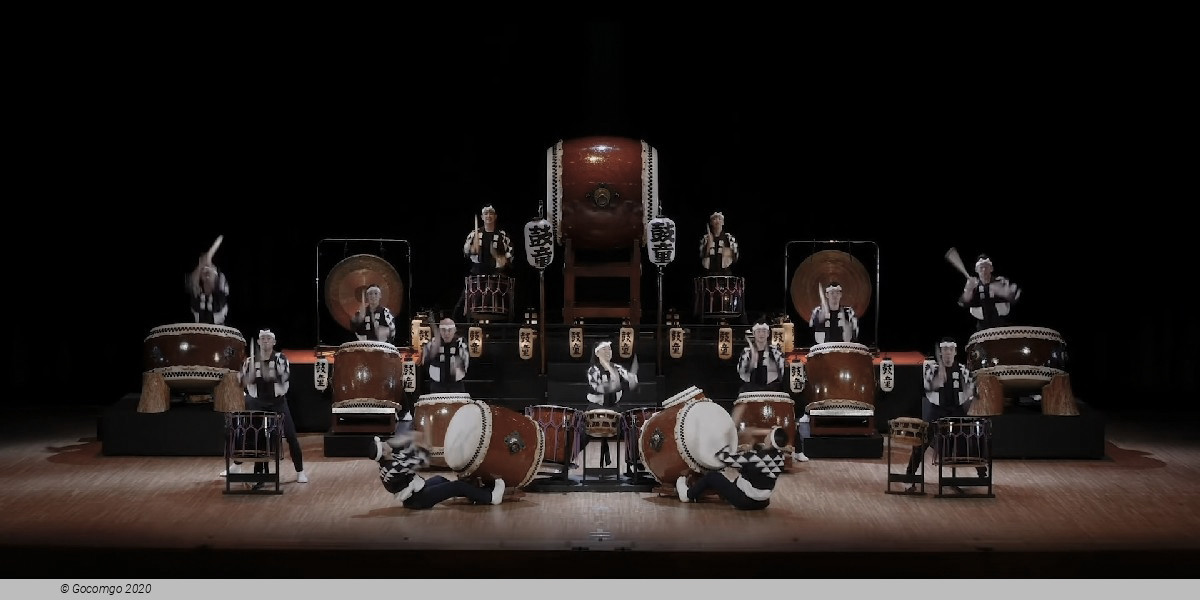Events1 results
About
Kodō is a professional taiko drumming troupe. Based on Sado Island, Japan, they have had a role in popularizing taiko drumming, both in Japan and abroad. They regularly tour Japan, Europe, and the United States. In Japanese the word "Kodō" conveys two meanings: "heartbeat" the primal source of all rhythm and, read in a different way, the word can mean "children of the drum".
Although taiko are the primary instrument in their performances, other traditional Japanese musical instruments such as fue and shamisen make an appearance on stage as do traditional dance and vocal performance. Kodō's repertoire includes pieces based on the traditional rhythms of regional Japan, pieces composed for Kodō by contemporary songwriters, and pieces written by Kodō members themselves. Since their debut at the Berlin Festival in 1981, Kodō has had almost 4,000 performances, spending about a third of the year overseas, a third touring in Japan and a third resting and preparing new material on Sado Island.
History
Kodō was formed in 1981 and made their debut at the Berliner Philharmonie in the same year. Kodō is sometimes considered to be simply renamed from the taiko group Ondekoza organized in 1971. Indeed, Kodō was formed out of the existing members of Ondekoza, but their leader, Den Tagayasu, left the group before the transition and lead performer Eitetsu Hayashi left quickly thereafter. Tagayasu continued to use the name Ondekoza for his new group, and required the group to choose a new name. Hayashi, who departed from the group soon after its founding to begin a solo career, suggested the name "Kodō". Hayashi created the name based on the dual meaning of the word; the first, "drum children", was based on feedback from mothers that their music lulled their children to sleep. The second meaning, "heartbeat" originated from comparing the sound of taiko drums to the sound of a mother's heartbeat on her child in the womb.
The group spent the next 7 years touring Europe, Japan, North and South Americas and the Far East. Following this, they founded Kodō village on Sado Island, and also started an annual Earth Celebration, an international arts festival on Sado Island that is managed by the city of Sado and the Kodō Cultural Foundation.
Kodō had three sold out performances at the 1984 Olympic Arts Festival in Los Angeles, a 10-week event which preceded the 1984 Summer Olympics.
In 1989, the group held its first drum workshop, referred to as Kodō Juku which includes introducing their training regiment and their approach to taiko performance. These workshops are held up to four times a year and do not require any background in drumming.
The non-profit Kodō Cultural Foundation was established in 1997, and three years later, they founded the Kodō Arts Sphere America organization in North America. This organization started to present workshop tours in 2003.
Reputation
The three performers in front playing chu-daiko are wearing fundoshi.
Kodō is arguably the most well-known and respected taiko group worldwide and has been considered an ambassador group for taiko performance outside Japan. One component of their reputation stems from their training regimen, which at one time, included long distance running twice daily. A report on Kodō's training in 1989 stated that their approach had been toned down, but was still "disciplined" according to the program director, where performers would only run ten kilometers each morning.
In performance, players are often seen wearing a sole loincloth called a fundoshi as a component of attire. Internal publications from the group state that they are used to help focus a player's strength while performing. Others have noted that the use of fundoshi clearly represents a masculine component to the Kodō's performance. After their performance at the 1984 Olympics, Mark Swed of the Los Angeles Herald wrote, "Glistening back muscles of a sweaty loin-clothed drummer are strikingly lit as he strikes the great o-daiko (large taiko) with massive sticks in a performance as much athletic as it is musical."
Awards
Kodō received the MIDEM Music Video (Long Form) Award at the 3rd International Visual Music Festival in Cannes in 1994, as well as the Japanese Foreign Ministry Award noting their cultural contributions through the Earth Celebration event on Sado Island.[26] They were also the recipient of the Matsuo Performing Arts Award for Japanese Music in 2012.



